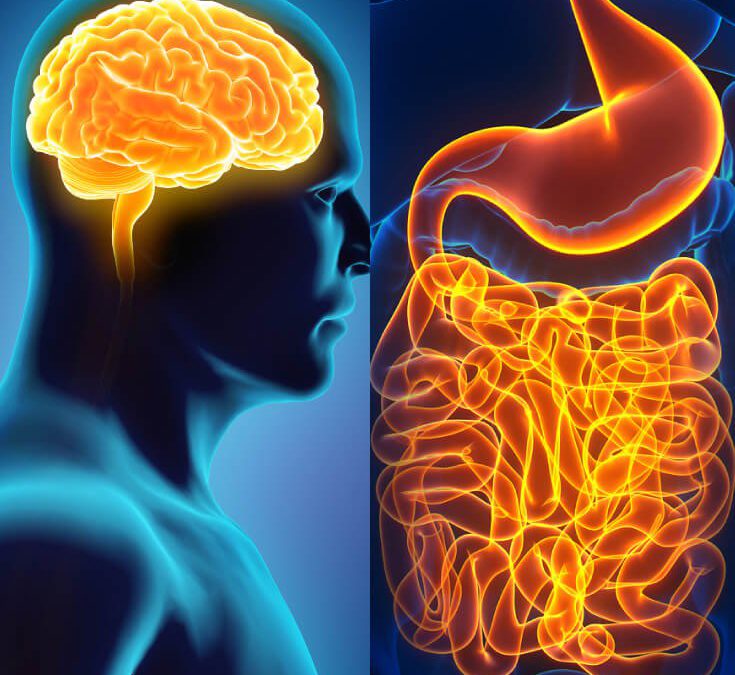There’s this thing called “gut-brain”, and it’s real. Have you ever made a decision based on a gut feeling that you have, or the butterflies that you’re feeling in your stomach? These are the expressions we use to describe the emotions and guidance that we’re getting from our gut. When you have a gut feeling, it’s your gastrointestinal tract sensing a series of emotional triggers.
This gut-brain has always been a guide for me. Whenever I have an intuitive instinct about something, when I just “know” something, I feel it deep in my gut. It’s an inner knowing that is true and unshakeable – and when it communicates to me, it’s never wrong. I trust this brain to deliver intuitive information to me without abandoning my head and my heart.
Let’s go deeper into this feeling of intuition and why you should never dismiss what your gut is trying to tell you as just “feeling a little sick to your stomach”.
The “Gut-Brain” Connection
The smaller brain in your gut is called the enteric nervous system (ENS). This system is a network of more than 100 million nerve cells that line your gastrointestinal system. All of these neurons not only communicate with gut bacteria to help your body digest food, they also process through this “brain” your emotions and thoughts.
The Mystic Second Mind
The Chinese and Taoist mystics call gut-brain the “first mind” as it evolutionarily predates the brain in your head. Many practices of traditional medicine have long recognized the connection between the gut and physical, mental, and spiritual health. And now modern medicine and science are finally catching up.
Jay Pasricha, M.D., director of the Johns Hopkins Center for Neurogastroenterology, has done a lot of research on the enteric nervous system that has gained international attention. Pasricha says, “The enteric nervous system doesn’t seem capable of thought as we know it, but it communicates back and forth with our big brain—with profound results.”
The second mind is this brilliant and intuitive brain that speaks to you – and when your gut brain communicates with the brain in your head, together they make decisions. Listening to what these two brains are saying can change your mood and your physiology.
But what exactly does this mean to you and your health?
Gut Health and Your Immune System
70% of your immune system exists in your gut. So what’s going on in there is going to have a direct impact on your health and immune system. Although not all disease starts in the gut, many conditions are directly influenced when your gut health is compromised. Chronic inflammation is often the main symptom of poor gut health, as your body’s immune system fights what’s going on in your gut.
When your immune system starts to break down, you start to become sick. When I was a child, whenever I felt stressed or threatened and things just didn’t feel right, my body reacted with strep throat. I was unable to stop the cycle of gut-brain affecting my health, but now that I understand the correlation between my gut and my brain, I’m able to pay attention to my second brain and what it’s telling me.
There are two important components to keeping your gut-brain happy and working for you: 1) focusing on what you eat, and 2) taking care of your spiritual health.
You Are What You Eat
Your gut-brain is directly connected to the limbic system, which controls your emotions and feelings. It’s the limbic system that speaks to your brain and makes decisions with your gut. Therefore the term, “you are what you eat”, has a lot of validity when it comes to both your physical health and mental well being. The energy of the food you eat and the nutrients you put into your body are going to determine what types of messages your gut-brain is communicating to your head-brain.
There’s a direct connection between poor gut health and some physical illnesses, such as type 2 diabetes and heart disease. Poor gut health is also linked to mental health. For instance IBS has been linked to anxiety and depression.
There’s a lot of information on what foods are best to promote good gut-brain health, so it can quickly become confusing about what you should be eating and what you should eliminate from your diet. My advice is to keep it simple – Lighten up your diet with fresh fruits and vegetables. Limit the amount of sugar and artificial ingredients you consume. And try to introduce foods and beverages to your daily diet that are rich in probiotics and prebiotics, such as yogurt, kefir, sauerkraut, and dandelion greens.
Mindfulness For Your Gut
We’ve talked about taking care of your gut-brain by feeding it right. Now it’s time to focus on bringing quiet and peace to your second brain through mindfulness. Mindfulness can mean a lot of different things to different people. But the main premise is the same – be mindful and be aware of your feelings, thoughts, and body sensations in the environment around you. By tuning into your gut-brain, you’ll become “quiet” enough to listen to both your gut-brain and your brain – and pay attention to the feelings these brains are evoking within you.
One of the best ways to practice mindfulness is through meditation. Meditating and paying attention to your second brain brings a calmness and a sense of peace to your life. It gives you valuable information and it directs you in ways that the brain and mind are too busy to pay attention to. Yet these two brains are inextricably linked. Connecting both these brains can boost your sense of inner strength, power and intuition.
Meditation to Calm Your Gut and Mind
Some of you will prefer to sit in the lotus position when mediating, while others may find that standing and moving during meditation is more effective. There is no right or wrong method to meditate – do what feels right for you so long as you’re focusing your mind in your gut area.
This is what we do in my workshops – I call it dropping down into the second brain:
Sit still and relax. Your focus is on shutting off the brain in your head and, using your intention, drop into your second chakra. The second chakra, or sacral chakra, is located in your lower abdomen right below the navel. The sacral chakra is associated to your emotions and also plays a role in the body’s metabolism and immune system.
Don’t force the intent, just let it be and speak to you in a language through your heart.
Once you’ve gotten used to dropping into the second mind, use a standing meditation for 5 minutes each day. You can stand at the sink and wash dishes, or stand looking out the window, holding your intention in your mind in your second brain.
After you’ve practiced this standing meditation for 5 to 10 days, you can then move into a walking meditation. Take a walk outside, holding your intention and attention in your second mind. With practice, everything will come to life. You’ll see that everything is energy and that God exists within everything.
Last Thoughts
When your gut and mind work in harmony, your physical, mental, and spiritual well being are balanced and in alignment. When these two brains work against each other they produce disharmony that manifests in a negative energy. This negative energy can have a profound harmful affect in every area of your life. Use my guidance here to harmonize the connection between your two brains and notice the great energies happening in your life.




